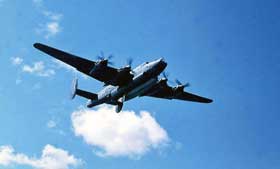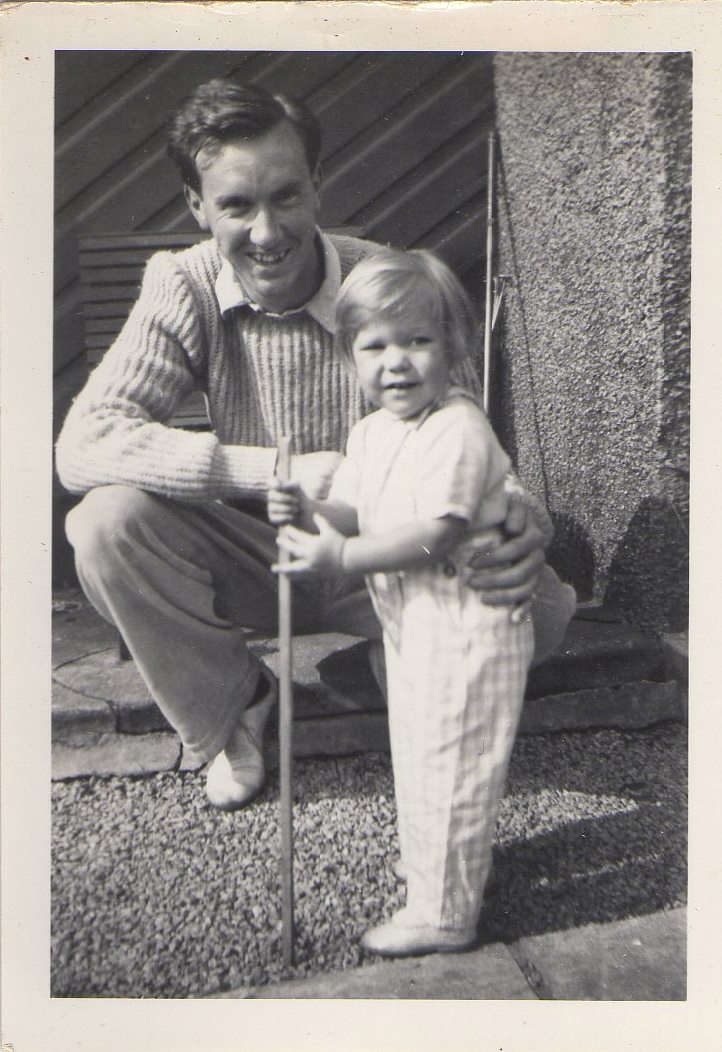Part 5 - Burnett in the RAF
Burnett in the RAF
In 1955 I graduated BSc and also completed my engineering apprenticeship. The National Service Act was still in force so I had no option but to join HM Forces. I applied to join the RAF and because of my degree I was invited to go down to London and attend for interview at the Air Ministry. I must have made a reasonable stab at seeming to be officer material because I was soon called to RAF Cardington for one week prior to going on to Officer Cadet Training at Jurby, Isle of Man in September 1955. My time in the Army Cadet Force at school was good training for OCTU's "Bullshit Baffles Brains" procedures as I was able to bull up my parade boots with lots of Cherry Blossom and spit and put the correct creases in my battle dress. Arms and parade ground drill was also a doddle after five years in the Army Cadet Force (affiliated to the Argyll & Sutherland Highlanders) in School during which I rose from cadet to Company Sergeant-Major. (Although I remember once being bawled out by the Drill Warrant Officer for swinging my arms Highland Regiment fashion, “It’s very pretty Mr Pender, but it isn’t Royal Air Force.”) There was also a fair amount of paperwork but after the practice in swatting we had all had at university that wasn't too bad. All in all therefore officer cadet training was no great problem and I coasted through. Come December 1955 I was appointed to the rank of Pilot Officer.
As a Technical Branch Officer I was posted to the RAF Technical College at Henlow to learn how to look and sound as if I knew something about Aircraft maintenance. Come April 1956 I was posted to Coastal Command at RAF Kinloss in Morayshire as Technical Adjutant.
When you have good NCO's and WO'S under you this is a comparatively easy job, and I had good subordinates who had been doing their jobs for yonks so they could keep the Technical Wing ticking over with their eyes shut. I should say that a regular sergeant’s pay was considerably more than that of a national service pilot officer so perhaps they should have more competent! I know they got more because one of my jobs was to collect the Wing's other ranks' pay in pound notes and florins from station accounts office. (I had to count it there and sign for the money so if I made a mistake when paying out I had to make up the difference out of my pocket, so you can imagine I was very careful in counting it out.) I would take the cash back to the main hangar and dole it out with care to the O/R's.
However let it not be thought that apart from that I just sat behind my desk twiddling my thumbs all day, signing the odd form put in front of me. Oh no, I was also Station Golf Officer, and it was up to me to organise the Station's golf outings. This meant of course that I had to maintain my own golfing expertise. Thus during the Summer months, and up in the Riviera of the North the days were about twenty hours long, I could play anything up to ten rounds a week over the Forres Course where RAF Kinloss had a group membership. In addition, since the station housed an Operational Conversion unit, in which aircrew were taught to fly AVRO Shackletons, a lot of training flying went on. Thus inter-station matches could be arranged with up to twenty personnel and their golf clubs being flown down to St Eval or St Mawgan in an otherwise empty Shackleton.
All that golf improved my game such that I played for the Forres club team and the Coastal Command team, just as I had played previously for the Elderslie club team. In fact the climax came when in 1957 I reached the final of the Elderslie Club Championship in which I was comprehensively beaten by 8 and 7 over 36 holes by John Gardner (no relation) a Renfrewshire County team member for some years.
I was also Officer i/c station bicycles, which meant that I had to keep track of something like 120 bicycles. With the best will in the world bikes do tend to get lost. That was where it paid to keep well in with the Warrant Officer i/c Workshops part of whose function it was to keep the station bicycles in good condition. This meant that it was in his power say when a bicycle was beyond repair and should be scrapped. If, therefore during an inventory I found that a bicycle had in some mysterious fashion vanished, it required but a quiet word in the ear of W/O Workshops. Bikes were scrapped on a regular basis and were of course cut up into small pieces to ensure that they stayed scrapped. It is very difficult to look at a pile of bits of scrap bike and be certain how many bikes it contains, thus if two bikes were scrapped the numbers of three bikes could be erased from the inventory. I am not quite sure what was done in the event that an aircraft disappeared but I imagine much the same procedure was followed!
However all good things came to an end and come September 1957 I was demobbed and catapulted back into civilian life. The thought of having to start actually working for a living gave me the shivers, so I applied through the Chemical Engineering Department of the Royal College of Science and Technology, Glasgow for a Dept of Scientific and Industrial Research (DSIR) grant to study for a Diploma in Chemical and Process Engineering. I found that after two years in the RAF a return to studying was quite a wrench and was not the easy route into Industry I had anticipated its being. Nevertheless I managed to stumble through the work and gained my Diploma.

